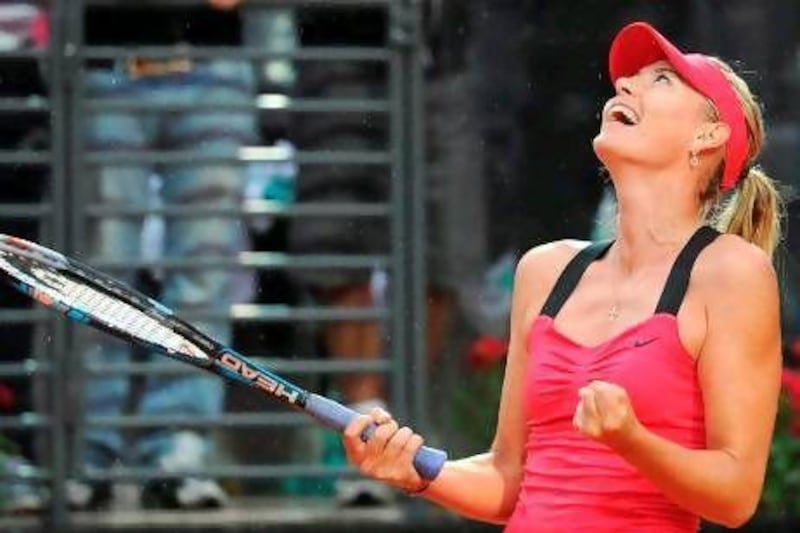In a loopy world, Maria Sharapova is a victim of her own ads.
Her turns of fashion and glamour have boosted her income while muddling her renown. Her status as one of the players whose wins seem "good for tennis" owes to her looks, while her merit stems from the vast reservoir of fight she has used to wring results from her ugly, limited game.
Somewhere out there lurk people who still think of her as a character of glamour rather than one of grit and grind. Somewhere out there lurk people who still think the Earth flat.
Further evidence of boundless fight came on Sunday, when Sharapova trailed Li Na by 6-4, 4-0 in the final in Rome, then climbed back through rain delays et al for a 4-6, 6-4, 7-6 victory that sent her ambitiously toward Roland Garros.
Oddly, it also called to mind a forgettable, memorable match from Roland Garros three years ago. In a tournament that saw her exhilarated return from a 10-month absence with her fractious shoulder, Sharapova reached the quarter-finals. There, she proceeded to fall behind 6-0 and 5-0 and match point against the upstart Slovakian Dominika Cibulkova.
Not every day do you see a three-time grand slam champion and former world No 1 player fall behind 6-0 and 5-0 and match point. In fact, you could watch an inordinate, unhealthy amount of tennis and see it never.
It looked weird. At one point, Sharapova went ahead and tried a left-handed forehand and that, too, croaked.
Well, she saved that match point. She broke Cibulkova's serve to get to 6-0, 5-1. She held her own serve to get to 6-0, 5-2. She saved four match points all told. And in that goofy juncture of women's tennis, just before Cibulkova went ahead and won the set 6-2, came an ultimate tribute to Sharapova: the very real sense she could win the thing because she is Sharapova.
Everybody wants to win; some want to win more.
As Serena Williams once said of Sharapova: "I just think we both have similar personalities, like she seems like she wants to win a lot."
Long, long ago in 2004, Sharapova came to a Wimbledon final at 17, stunned Williams with a rout and said: "To tell you the truth, I don't know what happened in the match. I don't know how I won. I don't know what the tactics were. I was just out there … I was in my own little world. I don't know what world that was, really."
At that point, people forecast the moon for her. The eight years since have proved slightly less impressive and, in turn, hugely more impressive.
She has claimed two more grand slam titles, three more finalist showings, seven more finishes as a semi-finalist. She also has not beaten Williams since 2004 - with seven straight losses - and has looked slow or insufficiently gifted in recent grand slam final losses to Victoria Azarenka (Australia) and Petra Kvitova (Wimbledon).
Yet through those grinds, the identity changed but went cloaked by the ads. It went from potentially dominant champion to commendable alley-fighter, even if nobody could see for the ads.
The size of her fight found umpteen turns of evidence, not least her drive to play in pain when that shoulder reached its heights of screaming.
Now, she plays Paris again for a fifth attempt to complete the career grand slam claimed by only seven other women and only four others upon three different surfaces.
She comes off a 2011 French Open she might have won, losing in a semi-final to the eventual champion Li by committing 10 double faults, three in a pivotal second-set game.
Her ranking, down to No 14 at the end of 2009 and No 10 after 2010, has taken residence lately at No 2.
Like Novak Djokovic in what will be the louder career grand slam bid, she has yet to grace a French Open final. Like Djokovic, her French Open past shows she might not win, yet her overall past shows nobody will faint of shock if she does.
If she wins, it would be the quirkiest three-surface career grand slam to date, the others (Williams, Martina Navratilova, Chris Evert, Steffi Graf) having won their slams by the truckload such that the career slam seemed mere by-product. If she wins, she would have one of each of the big four, that ultimate sign of adaptability. If she wins, it will have come through a steady cobbling born of admirable will.
And if she wins, everybody will look, most for all the wrong reasons.
Follow us
[ @SprtNationalUAE ]
& Chuck Culpepper
[ @ChuckCulpepper1 ]





